高中英语必修四语法(人教版)
- 格式:docx
- 大小:28.22 KB
- 文档页数:6

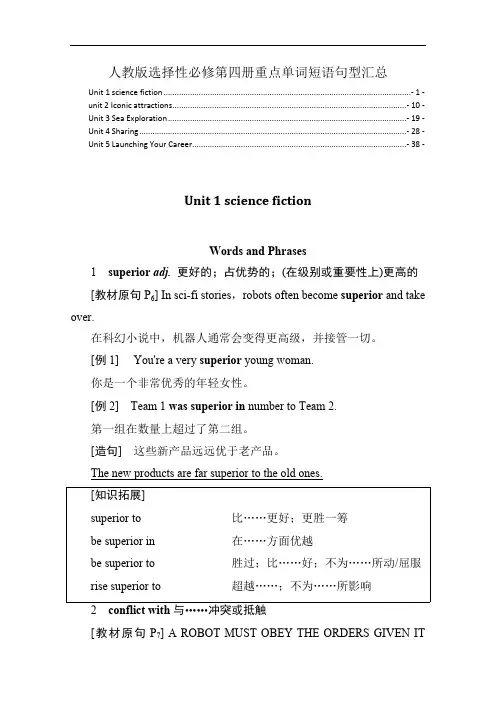
人教版选择性必修第四册重点单词短语句型汇总Unit 1 science fiction................................................................................................................- 1 -unit 2 Iconic attractions..........................................................................................................- 10 -Unit 3 Sea Exploration............................................................................................................- 19 -Unit 4 Sharing.........................................................................................................................- 28 -Unit 5 Launching Your Career.................................................................................................- 38 -Unit 1 science fictionWords and Phrases1 superior adj.更好的;占优势的;(在级别或重要性上)更高的[教材原句P6] In scifi stories,robots often become superior and take over.在科幻小说中,机器人通常会变得更高级,并接管一切。
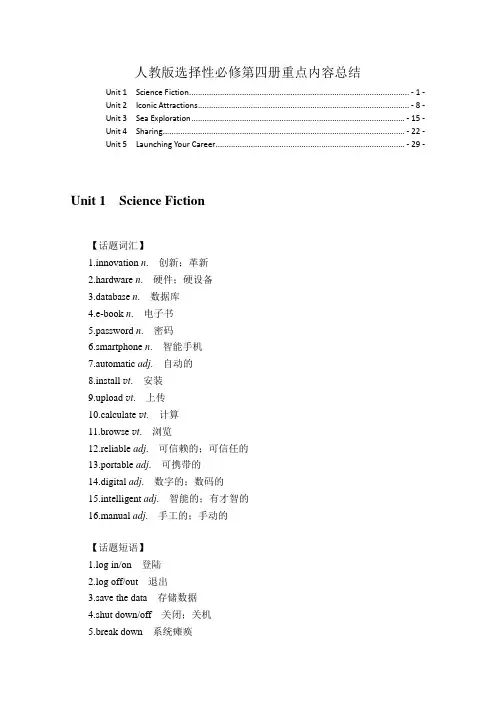
人教版选择性必修第四册重点内容总结Unit 1Science Fiction .................................................................................................... - 1 - Unit 2Iconic Attractions ................................................................................................ - 8 - Unit 3Sea Exploration ................................................................................................. - 15 - Unit 4Sharing .............................................................................................................. - 22 - Unit 5Launching Your Career ...................................................................................... - 29 -Unit 1Science Fiction【话题词汇】1.innovation n. 创新;革新2.hardware n. 硬件;硬设备3.database n. 数据库4.e-book n. 电子书5.password n. 密码6.smartphone n. 智能手机7.automatic adj. 自动的8.install v t. 安装9.upload v t. 上传10.calculate v t. 计算11.browse v t. 浏览12.reliable adj. 可信赖的;可信任的13.portable adj. 可携带的14.digital adj. 数字的;数码的15.intelligent adj. 智能的;有才智的16.manual adj. 手工的;手动的【话题短语】1.log in/on 登陆2.log off/out 退出3.save the data 存储数据4.shut down/off 关闭;关机5.break down 系统瘫痪6.artificial intelligence(AI) 人工智能7.the information superhighway 信息高速公路8.make a breakthrough 突破rmation Technology 信息技术10.remote control 远程遥控【话题佳句】1.In 2015, Chinese scientist Tu Youyou won the Noble Prize in Physiology or Medicine due to the great breakthrough she had made in medicine。

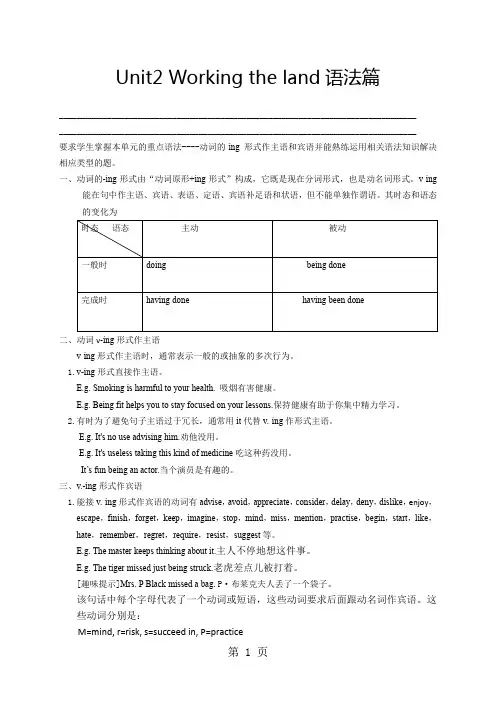
Unit2 Working the land语法篇____________________________________________________________________________________________________________________________________________________________________要求学生掌握本单元的重点语法----动词的-ing形式作主语和宾语并能熟练运用相关语法知识解决相应类型的题。
一、动词的-ing形式由“动词原形+ing形式”构成,它既是现在分词形式,也是动名词形式。
v-ing能在句中作主语、宾语、表语、定语、宾语补足语和状语,但不能单独作谓语。
其时态和语态的变化为二、动词v-ing形式作主语v-ing形式作主语时,通常表示一般的或抽象的多次行为。
1.v-ing形式直接作主语。
E.g. Smoking is harmful to your health.吸烟有害健康。
E.g. Being fit helps you to stay focused on your lessons.保持健康有助于你集中精力学习。
2.有时为了避免句子主语过于冗长,通常用it代替v.-ing作形式主语。
E.g.It's no use advising him.劝他没用。
E.g. It's useless taking this kind of medicine吃这种药没用。
It’s fun being an actor.当个演员是有趣的。
三、v.-ing形式作宾语1.能接v.-ing形式作宾语的动词有advise,avoid,appreciate,consider,delay,deny,dislike,enjoy,escape,finish,forget,keep,imagine,stop,mind,miss,mention,practise,begin,start,like,hate,remember,regret,require,resist,suggest等。
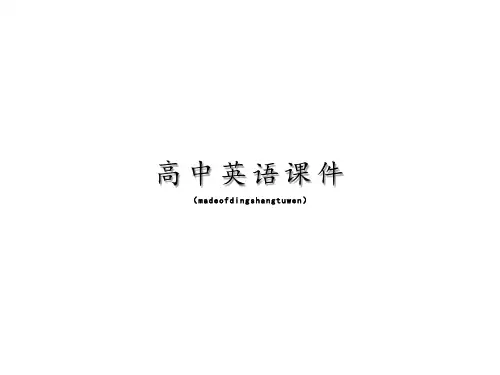
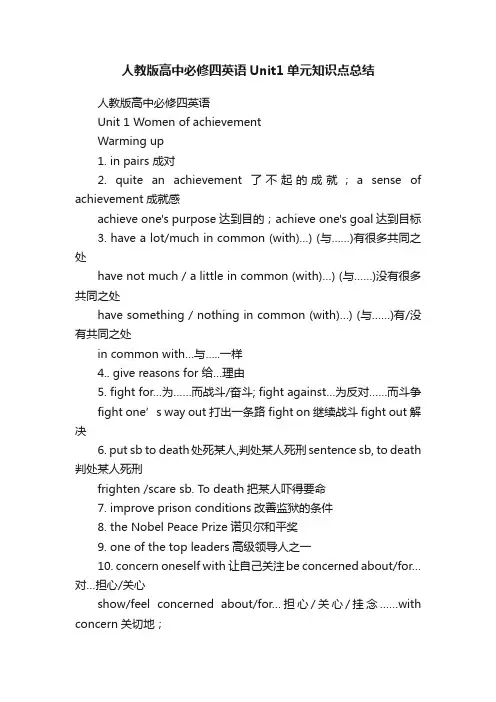
人教版高中必修四英语Unit1单元知识点总结人教版高中必修四英语Unit 1 Women of achievementWarming up1. in pairs 成对2. quite an achievement 了不起的成就;a sense of achievement成就感achieve one's purpose达到目的;achieve one's goal达到目标3. have a lot/much in common (with)…) (与……)有很多共同之处have not much / a little in common (with)…) (与……)没有很多共同之处have something / nothing in common (with)…) (与……)有/没有共同之处in common with…与…..一样4.. give reasons for 给…理由5. fight for…为……而战斗/奋斗; fight ag ainst…为反对……而斗争fight one’s way out打出一条路fight on继续战斗fight out解决6. put sb to death处死某人,判处某人死刑sentence sb, to death 判处某人死刑frighten /scare sb. To death把某人吓得要命7. improve prison conditions改善监狱的条件8. the Nobel Peace Prize诺贝尔和平奖9. one of the top leaders高级领导人之一10. concern oneself with 让自己关注be concerned about/for…对…担心/关心show/feel concerned about/for…担心/关心/挂念……with concern关切地;have no concern for…毫不关心……have no concert with…. 与……无关as far as I am concerned 在我看来11.. welfare projects福利项目12.. China Welfare Institute中国福利协会13. a specialist in women's illnesses妇科疾病的专家14. devote all her life to将自己的一生献给… 致力于…devote sth /oneself to +n./pron./doing 或be devoted to +n./pron./doing奉献……于……15. encourage sb 鼓励某人;encourage sb to do sth.鼓励某人做某事16. show the connection between A and B显示出A和B之间的联系the connection of A with B A与B的关系/联系in connection with…与……相关联;关于……be connected with…与……有关系;与……有亲戚关系“与……有关系”表达法:be related to ; be linked with; be involved in ; be in relation to ; be in connection with17. a campaign for…争取得到……的运动 a campaign against…反对……的运动a campaign to do…为了做……而进行的运动campaign for…参加争取……的运动campaign against…参加反对……的运动18. as…as possible (= as…as one can) 尽可能……“尽力做某事”的表达法有:try to do sth. try/do one’s best to do sth.do all/ everything (that) one can to do sth.; do what one can to do sth.;make every effort to do sth; make efforts to do sth.; spare noeffort to do sth.;go all out to do sth.; do everything in one’s power.19.. rather than而不是Pre-reading, reading and comprehending20. behave like humans像人类的举止behave oneself举止得体;守规矩behave like…表现得像……behave towards…对待……behave well/with good manners表现好/有礼貌behave badly 表现不好21. the night before前一天晚上22. in the shade of…在……的阴影下in the shade 在阴凉处23. move off离开;启程;出发(=start (out)= set out= set off)Move away搬走;move out迁出;搬出去move on继续前进;进行搬迁24.warn sb. of /about sth.警告/提醒某人某事warn sb. against doing sth; 或者warn sb not to do sth. 警告某人不要做某事25. make it all worthwhile觉得这一切都是值得的It is worthwhile to do sth or It is worthwhile doing sth.做某事是值得的be wo rth one’s while doing / to do s th. 值得做某事注意这些句型的差异:worth; worthy; worthwhile1)be worth + n.=be worthy of + n.The matter is worth consideration =The matter is worthy of consideration.这件事值得考虑。

人教版高中英语必修一至必修四语法(总18页)-CAL-FENGHAI.-(YICAI)-Company One1-CAL-本页仅作为文档封面,使用请直接删除1.名词性从句在句子中起名词作用的句子叫名词从句 (Noun Clauses)。
名词从句的功能相当于名词词组, 它在复合句中能担任主语、宾语、表语、同位语、介词宾语等,因此根据它在句中不同的语法功能,名词从句又可分别称为主语从句、宾语从句、表语从句和同位语从句。
一、引导名词性从句的连接词引导名词性从句的连接词可分为三类:连词:that(无任何词意)whether,if(均表示“是否”表明从句内容的不确定性)as if ,as though(均表示“好像”,“似乎”)以上在从句中均不充当任何成分连接代词:what, whatever, who, whoever, whom,whose, which.whichever,whomever连接副词:when, where, how, why不可省略的连词:1. 介词后的连词2. 引导主语从句和同位语从句的连词不可省略。
That she was chosen made us very happy.We heard the news that our team had won.比较:whether与if 均为"是否"的意思。
但在下列情况下,whether 不能被if 取代:1. whether引导主语从句并在句首2. 引导表语从句3. whether从句作介词宾语4. 从句后有"or not"Whether he will come is not clear.大部分连接词引导的主语从句都可以置于句末,用 it充当形式主语。
二. 主语从句作句子主语的从句叫主语从句。
主语从句通常由从属连词that,whether,if和连接代词what,who,which,whatever,whoever以及连接副词how,when,where,why等词引导。

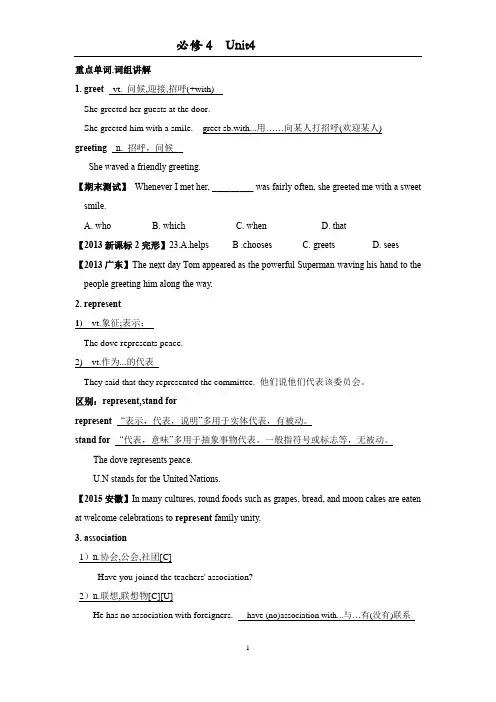
重点单词.词组讲解1. greet vt. 问候,迎接,招呼(+with)She greeted her guests at the door.She greeted him with a smile. greet sb.with...用……向某人打招呼(欢迎某人) greeting n. 招呼,问候She waved a friendly greeting.【期末测试】Whenever I met her, _________ was fairly often, she greeted me with a sweet smile.A. whoB. whichC. whenD. that【2013新课标2完形】23.A.helps B .chooses C. greets D. sees 【2013广东】The next day Tom appeared as the powerful Superman waving his hand to the people greeting him along the way.2. represent1)vt.象征;表示;The dove represents peace.2) vt.作为...的代表They said that they represented the committee. 他们说他们代表该委员会。
区别:represent,stand forrepresent “表示,代表,说明”多用于实体代表,有被动。
stand for “代表,意味”多用于抽象事物代表。
一般指符号或标志等,无被动。
The dove represents peace.U.N stands for the United Nations.【2015安徽】In many cultures, round foods such as grapes, bread, and moon cakes are eaten at welcome celebrations to represent family unity.3. association1)n.协会,公会,社团[C]Have you joined the teachers' association?2)n.联想,联想物[C][U]He has no association with foreigners. have (no)association with...与…有(没有)联系associate v.联想,把...联想在一起They associate turkey with Thanksgiving. associate...with...把……与……结合起来【2012北京完形】48. A. attention B. association C. attraction D. adaptation 【2014浙江】We associate piggy banks with children4.curious adj. 好奇的,渴望知道的The boy was curious about everything he saw. be curious about 对……感到好奇He’s curious to know what she said. be curious to do sth. 渴望做……curiously adv. 1. 好奇地2. 奇异地,奇怪地;说来古怪He looked curiously at the people.curiosity n. 好奇心She did that just out of curiosity. from/out of curiosity 出于好奇【期末测试】People have always been about exactly how life on earth began.A. curiousB. excitedC. anxiousD. careful【期末测试】Little Johnny felt the bag, curious to know what it ____.A. collectedB. containedC. loadedD. saved【2014新课标1】you can take a photo or write a poem that shows what they are curious about.5. approach vt. vi1) 接近,靠近(可指距离或时间)When I approached, they grew silent.2) 找...商量Did Mary approach you about lending her some money?approach sb. on/about sth.与某人接洽/商量某事名词n.1) 接近,靠近;即将达到[U][(+of)]Snow announced the approach of winter.2) 通道,入口[C][(+to)]All approaches to the village are blocked.3) 方法,方式;态度I like her approach to the problem. approach to 接近;近似;(做某事)的方法(途径) 可以与介词to搭配的名词有:answer/key,entrance,visit(or),way/road,guide,monument等。
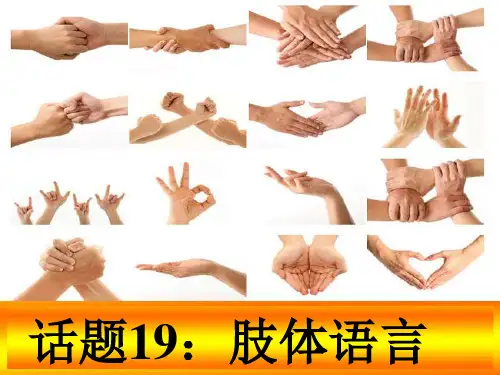
高中英语必修四第1-5单元重点词汇及语法(完整版)-CAL-FENGHAI.-(YICAI)-Company One1Unit 1 Women of achievement1.achieve v. 完成,达到;实现,获得achievement:n.完成;达到;成绩;成就e.g He will never achieve anything if he doesn’t work hard.不努力工作他什么也做不成。
The company has achieved a 100% increase in profitability.这个公司在利润方面获得了百分之百的增长We felt a great sense of achievement when we reached the top of the mountain.当我们到达山顶的时候,我们有一种很大的成就感。
2.connection: 联系;关系;连接物;连接,联结(with/between) Pl. 亲属;亲戚e.g There is a strong connection between smoking and heart disease.吸烟和心脏病之间有很大的联系。
The company has a connection with a number of Japanese firms.这个公司和日本的好多公司有联系。
This town has very good road and railway connections with the coast.这个小镇和海岸之间有着很好的公路及铁路连接。
She ‘s English but she has Irish connections.她是英格兰人但她有爱尔兰的亲戚。
in connection with: 有关e.g In connection with your request of March 3, we are sorry to tell you that we can’t give you a reply until the manager comes back next week.关于你三月三日的请求,很抱歉地告诉你直到下周经理回来我们才能给你答复。
人教版高中英语必修四Unit3 Life in the future课文全解(常考单词、高频短语和写作句式)Ⅰ. 常考单词必背1.aspect n.方面;层面I shall limit myself to three aspects of the subject.我将从三个方面来讨论这个问题。
2.impression n.[C]印象;感觉I am going to do all I can to remove the unpleasant impression you have of me.我打算尽最大努力去掉你对我不好的印象。
[快速闪记](1)have/leave/make a(n)...impression on sb 给某人留下……印象(2)impress vt.①印;压印②留下极深的印象impress sth on/upon sb/one's memory使某人铭记某事impress sb with sth (某事)给某人留下印象be impressed with/at/by...对……有深刻印象(3)impressive adj.给人深刻印象的;感人的;激动人心的3.constant adj.时常发生的;连续不断的constantly adv.不断地Teachers have to constantly update their knowledge in order to maintain their professional competence.教师为了保持职业能力,必须不断更新知识。
4.previous adj.在前的;早先的He recalled exactly what Bob had told him the previous night.他清楚记得前一天晚上鲍勃告诉他的话。
[快速闪记]in the previous chapter在上一章中previous to在……之前You must collect enough materials previous to your writing.你在写作之前必须收集好足够的材料。
人教版高中英语必修四词汇表(带音标及原文例句)Book4 Unit11.achievement /ə'tʃi:vmənt/ n.[C] 成就;功绩[U] 完成;达到;实现She inspires those who want to cheer the achievements of women.她激励着那些为妇女们的成就而欢呼喝彩的人。
(p2)2. welfare /'welfeə/ n.[U] 福利;福利事业She concerned herself with welfare projects, especially the China Welfare Istitute for women and children. 她非常关心福利项目,尤其是中国的妇女儿童福利基金会。
(p1)3.project n.[C] /ˈprɒdʒekt/工程;项目;规划; 专题研究4. institute / 'ɪnstɪtju:t / n.[C] 学会;学院;协会5. △China Welfare Institute 中国福利基金会6. specialist/ˈspeʃəlɪst/ n.[C]专家;专业工作者Lin Qiaozhi was a doctor who became a specialist in women’s illnesses.林巧芝是一位妇女疾病方面的专家。
(p1)7. △ specialize /ˈspeʃəlaɪz/ vi.专攻;专门从事;专注于8. △chimp /tʃimp/ n.[C] (非洲)黑猩猩(口语)= chimpanzee |ˌtʃɪmpænˈzi:|9. connection /kə'nekʃən/ n.[C,U]连接;关联;关系Her research showed the connections between chimps and human beings. 她的研究表明了黑猩猩和人类之间是有联系的。
高中英语必修四各单元单句语法填空与句子考查必修四Unit 1 Women of achievement单句语法填空1.___________( watch) a family of chimps ____________( wake ) is our first activity of the day .2.The audience ________________ ( seem ) to have enjoyed the concert.3.We each ________________ ( have ) been awarded a scholarship.4.Nobody but my parents _________________(have) learned the news till now.5.The students __________ ( behavior ) very well in the competition, which _______ (make) their parents quitesatisfied.6.This book is intended _____________ women in the countryside.7.It is really _______________________ (令人鼓舞的) to hear that China plays more and more important role in theinternational affairs.8.The rest of the survivals ____________________ (rescue) from the ruins.9.There ______________ ( be ) a desk and four benches in the office.10.Neither he nor I _____________ going to attend the meeting.句子考查1.Only by this means ______________________________________. ( 我们才能够解决这个问题)2.He ______________________________________( 强烈反对) the plan to cut taxes.3.Nowadays children_________________________________________________________ (花太多时间) playingcomputer games.4.这本词典是给高中生用的。
I 主语和谓语动词的一致1主语要和谓语动词保持人称和数的一致。
如:I am seventeen.She is sixteen.There is a desk in the room. There are no chairs in it.They have not come yet.Nobody knows who is going to win in the competition.What is the latest news about the Olympic Games?2两个名词由and连接作主语时,谓语动词一般用复数。
如:Wang Gang and Zhang Hua were here a moment ago.My brother and I have both seen the film.Both rice and wheat are grown in this part of China.说明(1) 当and不表示并列意义,连接两个在意义上表示同一人、物或概念或由两个部件配成的物品时,谓语动词用单数。
如:The professor and writer is speaking at the meeting.那位教授作家正在会上发言。
One more knife and fork is needed.还需要一副刀叉。
War and peace is a constant theme in history.战争与和平是历史永恒的主题。
(2) 两个并列的名词有each, every, many a等修饰语时,谓语动词一般用单数。
如:Each doctor and (each) nurse / Every doctor and (every) nurse was given a new shirt.每个大夫和护士都发了一件新衬衫。
NO sound and no voice is heard.-点声音都没有。
Many boy and (many a) girl has made the same mistake.许多男孩女孩都犯了同样的错误。
2电休名词group, class family army, enemy等作主语时,如果强调整体,谓语动词用单数形式;如强调个体,谓语动词用复数形式。
如:My family is a large one.The family are sitting at the breakfast table. (指家庭成员)Our group are reading the newspapers. (指组内成员)This group is having a meeting.The army is going to remain in this town.4不定代词anyone, anybody, anything, everyone, everybody, everything, someone,somebody,somethin g, no one, nobody, nothing, each, the other等做主语时,谓语动词用单数。
如:There is nobody in the house.Everything is ready.Someone wants to see you.5代词none和neither有时作单数看待,有时作复数看待,主要根据说话人的意思决定。
但是代表不可数名词时,只看作单数; neither 作形容词时与单数名词连用,谓语动词用单数。
如:None of them has/have arrived yet.他们中一个人都没到呢。
Neither of them knows/know the answer.他们俩都不知道答案。
None of this money is mine. 这钱不是我的。
Neither statement was true.两个陈述都不真实。
6当用作主语的两个名词或代词由or, either ... or, neither . nor或not only .... but also连接时,谓语:动词通常与邻近的名词或代词保持一-致。
如:either you or Jane is to be sent to New Zealand.要么你,要么简将被派往新西兰。
Neither he nor I have finished the experiment他和我都没有完成实验。
7由there或here引导的句子,主语不止一个名词时,谓语动词通常与邻近的名词或代词保持一致。
如:There is a lamp, two pens and six books on the desk.桌子上有一盏灯、两支钢笔和六本书。
Here are some envelopes and paper for you.这些是给你的信封和纸张。
8当主语后面接说明主语的修饰语,如with, along with, together with, as well as, like,rather than, but, except, besides, including, in addition to等时,谓语动词不受修饰成分的影响,仍保持同主语一致的关系。
如:The teacher with two students was at the meeting.那位老师和两个学生参加了会议。
The girl as well as the boys has learned to drive a car.这姑娘和男孩子们一道,学会了开车。
9表示时间、金钱、距离、重量等复数名词,在表示单位数量用作主语时,通常被看作整体,谓语动词用单数。
如:Sixty years is a long time. 60年是一段长时间。
Ten dollars is enough for him.10美元就够他用的了。
Fifty kilograms is not too heavy to be carried. 50公斤不至于重到扛不起来。
说明:如果强调数目,谓语动词用复数。
如:One hundred cents make adollar.100美分就是一美元。
More than fty years have passed since they got married.他们夫妻已共同走过了50多年。
(The Verb -ing form)动词-ing形式由动词原形+ -ing构成。
动词-ing形式能在句中作主语、宾语、表语、定语、宾语补足语和状语,但不能单独作谓语。
如:Collecting information is very important to businessmen.主语Learning a foreign language is very useful to me.Seeing is believing.Travelling abroad can be very exciting.He finished reading the book yesterday.I enjoy learning English.宾语:She suggested doing it in a different way.表语;The music is exciting.The most important thing is getting there in time.Her job was washing clothes.There is a swimming pool in our school.China is a developing country.定语The person translating the songs can speak seven languages.The boy standing there is a cla ssmate of mine.We heard her singing in her room.You can see them performing every night this week at the new theatre.We watch the children diving into the water from the diving board.Listen to the birds singin g.状语:She sat at the desk reading a newspaper.Being ill, she went home.Having finished their work, they had a rest.Feeling tired, she went to bed early.II构词法(Word formation)在英语中,1合成(Compounding)的构成方法主要有三种:合成、转化和派生。
由两个或更多的由分开的两的词合成一个词,有的用连词符号“”连接,有的直接连写在一起,还有blackboard万个词构成。
如:nightfall fantasyland cowboy everywhere somewherehowever whatever wherever maybe newspaperplayground backbone broadcast sunburn overthrowsnowstorm anyone myself eggplant reading-roombus-driver man-made blue-eyed passer-by worn-outup-to-date ice cream easy-going part-time bus stoppost office car park human rights grass roots2转化(Conversion)taste (v.)-taste (п.)It tastes good.It has a good taste.hand (п.) hand (v.)Please hand in your exercise books after class.clean (adj.)- clean (v.)Her room is clean and tidy.She cleans her room every day.shade (п.) shade (v.)She is sitting in the shade of a big tree.She shaded her eyes against the sun.词性转化后,有的单词读音会发生变化。